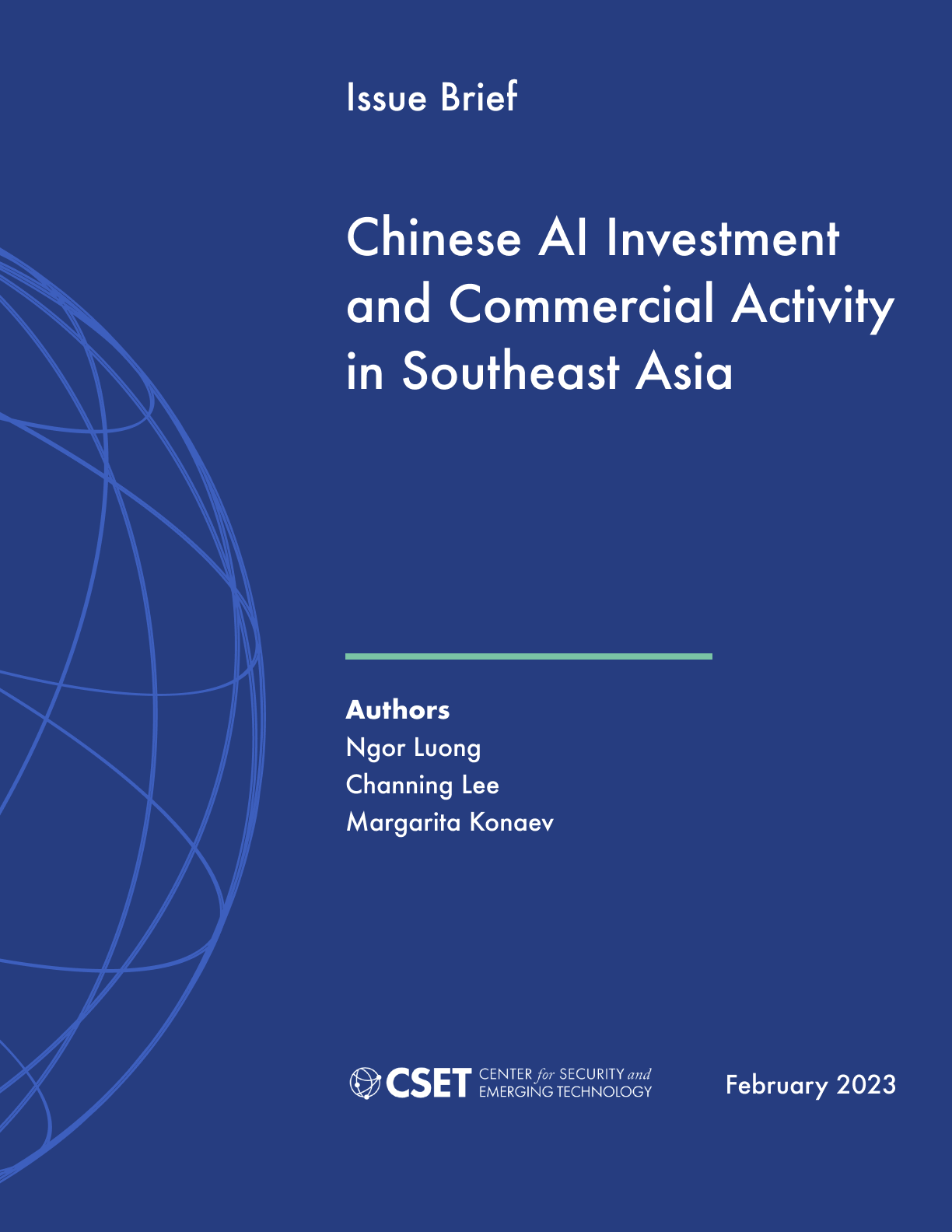Executive Summary
As part of its pursuit of global technology leadership, China’s government has pushed for Chinese firms to go abroad, including to Southeast Asia’s growing economies. Consistent with this mandate, Chinese financial and technology companies have scoured the region for opportunities to expand their market and strengthen the country’s competitiveness in emerging technologies such as artificial intelligence (AI). Southeast Asian countries have largely welcomed Chinese investments in their technology sectors, seeing the benefits of lower prices and more purchasing choices for high-quality products.1 That said, some experts are concerned that China’s push into Southeast Asia’s digital economy and the proliferation of Chinese technology in the region’s digital and telecommunications infrastructure will undermine the competitiveness of U.S. and European companies in these fast-growing markets, create risks related to data security and privacy, and strengthen Beijing’s ability to shape the global digital order, including norms and principles surrounding the use of AI.2
This report examines the scope and nature of Chinese investment in Southeast Asian AI companies and analyzes a range of AI-related linkages between Chinese technology companies and Southeast Asian government and commercial actors over the past decade. Using investment data from Crunchbase and data on AI-related overseas presence and activities of major Chinese firms collected by the Australian Strategic Policy Institute (ASPI) for the “Mapping Chinese Tech Giants” project, our key findings include the following:
AI investment:
- Singapore is the main destination for investment in Southeast Asian AI companies, accounting for 81 percent of the observed investment transactions in the region and 94 percent of all transaction value.
- Southeast Asian AI companies are attracting capital from all over the world, including from the United States, China, Japan, Germany, and the United Kingdom. More than 60 percent of the investment transactions targeting AI companies in Singapore, the Philippines, Thailand, Indonesia, and Malaysia involved foreign investors.
- Chinese investment in Southeast Asia’s AI companies has expanded over the past decade, but still trails behind that of the United States in terms of investment transactions. Between 2010 and 2021, investors from the United States participated in 33 percent of all investment transactions targeting AI companies in Southeast Asia, while Chinese investors took part in only 12 percent of all transactions.
- Despite the intensifying economic and technological competition between the United States and China, investors from these countries occasionally invest in the same AI companies. Co-investments by U.S. and Chinese investors account for a relatively small but notable share of the observed transactions involving U.S. or Chinese investors—about 12 percent of the 267 AI investment transactions featuring U.S. and Chinese investors and over $1 billion, or 18 percent of the total $5.6 billion coming from U.S. and Chinese investors over the past decade.
Other AI-related linkages:
- Physical presence—including activities such as setting up company subsidiaries, opening regional offices or headquarters, building data centers or research and development labs—is the most common type of AI-related linkage established between Chinese tech companies and Southeast Asian public and commercial entities. By expanding their economic and technological footprint in the region, China’s leading tech companies are also gaining access to new talent, data, and information.
- The majority of AI-related linkages between Chinese tech companies and Southeast Asian government and commercial entities are concentrated in Singapore, and to a lesser extent, Thailand, Malaysia, and Indonesia. While AI companies based in Thailand have not received funding from Chinese investors, Chinese tech companies have pursued other AI-related activities in Thailand, most notably selling surveillance equipment and working on smart city projects.
While China currently plays a limited role in Southeast Asia’s emerging AI ecosystems, especially outside of Singapore, there are indicators of expanding AI-related activity led by the country’s tech giants which are, in turn, supported by the Chinese government in their outreach and expansion in the region. Southeast Asia represents a potentially significant and still largely untapped AI market for China, and the countries in the region appear open to Chinese investment of various kinds. But when viewed through the strategic competition lens, growing Chinese influence in the region could curtail the set of economic and technology-related investment opportunities available to U.S. companies and hinder efforts to promulgate AI development in line with democratic principles and civil and human rights.
Download Full Report
Chinese AI Investment and Commercial Activity in Southeast Asia- Gatra Priyandita, Dirk van der Kley, and Benjamin Herscovitch, “Localization and China’s Tech Success in Indonesia,” Carnegie Endowment for International Peace, July 2022, https://carnegieendowment.org/2022/07/11/localization-and-china-s-tech-success-in-indonesia-pub-87477; Wiebke Rabe and Genia Kostka, “China’s Growing Digital Reach: Explaining Citizens’ High Approval Rates of Fintech Investments in Southeast Asia,” Review of International Political Economy, June 13, 2022, 1–27, https://doi.org/10.1080/09692290.2022.2044884.
- Jonathan Stromseth, “The testing ground: China’s rising influence in Southeast Asia and regional responses,” Brookings Institute, November, 2019, https://www.brookings.edu/research/the-testing-ground-chinas-rising-influence-in-southeast-asia-and-regional-responses/; Bonny Lin, Michael S. Chase, Jonah Blank, Cortez A. Cooper III, Derek Grossman, Scott W. Harold, Jennifer D. P. Moroney, Lyle J. Morris, Logan Ma, Paul Orner, Alice Shih, and Soo Kim, “Regional Responses to U.S.-China Competition in the Indo-Pacific,” RAND Corporation, 2020, https://doi.org/10.7249/RR4412; Yukon Huang and Jeremy Smith, “In U.S.-China Trade War, New Supply Chains Rattle Markets,” Carnegie Endowment for International Peace, June 24, 2020, https://carnegieendowment.org/2020/06/24/in-u.s.-china-trade-war-new-supply-chains-rattle-markets-pub-82145.
